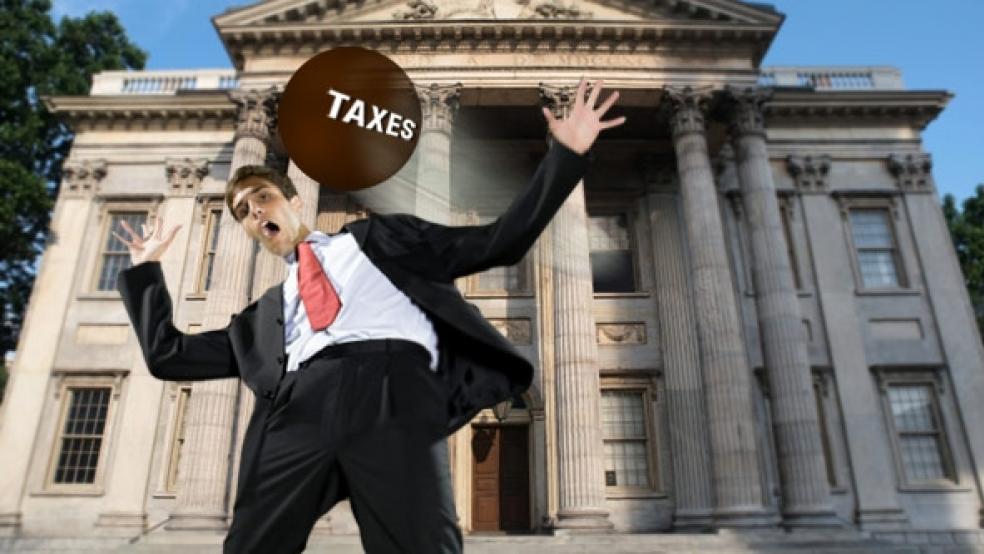New government data showing that federal workers are cheating Uncle Sam out of greater amounts of income tax revenue while enjoying cushier benefits and pay than those in the private sector. The IRS report has reignited a long-standing controversy on Capitol Hill: Should federal workers who fail to pay their taxes be held to a higher standard under the law than private sector workers?
About 98,000 federal, Congressional, and postal employees owed the Internal Revenue Service $1.03 billion in unpaid taxes at the end of fiscal 2010, according to a recent IRS audit of federal workers.
Add federal retirees and military personnel to that roster, and the overall amount federal workers owe in back taxes swells to 3.4 billion.
That includes $833,970 in unpaid taxes from 36 White House aides—an irony that was not lost on dozens of mostly conservative Web sites who classified it as ludicrous that despite President Obama’s recent calls for every American to “pay their fair share” in taxes, members of his own inner circle weren’t obliging. The IRS audit also showed House and Senate staffers owed $10.6 million in back taxes, Health and Human Services staffers owed $41 million, and Environmental Protection Agency staffers owed $19 million.
Including wages and benefits, federal workers on average earn an average of 16 percent more in total compensation than their private sector counterparts, according to a separate Congressional Budget Office report out this week.
Clamping down on federal employee pay is attractive to many Republican lawmakers, who last winter proposed slashing federal workers salaries and benefits in order to fund an extension of the payroll tax cut — a levy 160 million Americans pay to fund the federal Social Security retirement program. Congress is again hard-pressed to come up with finances to extend the 2 percentage-point tax cut beyond the end of this month, when it's due to expire again.
“If you work for the federal government and you don't pay your taxes, you should be fired.”
“It is totally unacceptable to live on the federal payroll and not pay your taxes,” said Congressman Jason Chaffetz, R-Utah, in a statement. Chaffetz has long favored imposing harsher treatment on federal workers who owe taxes than their private sector counterparts. Under federal labor law, it is illegal for an employer to terminate an employee on the basis that their earnings are garnished for any one debt, including owing taxes, except in case of IRS employees who can be terminated for unpaid taxes. “If you work for the federal government and you don't pay your taxes, you should be fired,” Chaffetz said.
Legally, federal workers are subject to the same treatment as other taxpayers who don’t pay some or all of their taxes. So it should come as no shock that there is “some” level of delinquency exists since “federal workers are going to be no more familiar with the tax code and that tax code’s requirements than the average citizen,” said Chris Edwards, director of tax policy studies at the libertarian Cato Institute.
Although the 2010 dollar amount of federal workers tax cheating rose by 3 percent over 2009 levels, the number of tax dodgers actually fell by more than 3,000. That rising dollar amount could reflect inflationary costs more than extra cheating, said Mark Luscombe, a tax attorney and principle analyst at CCH, a tax publisher.
However, from a public relations standpoint, federal workers are subject to some additional scrutiny on paying taxes. Since 1993, the IRS has collected an annual inventory of federal worker tax delinquency rates, which the agency then reports out to the department and independent federal agency heads. The whole exercise is meant to nudge agency heads to tell employees to pay their tax bills as part of their responsibility as a federal employee, as enumerated by the law, an IRS spokesman said. Yet, penalties are no different -- they receive the same delinquency notices and have the same amount of time to settle their outstanding taxes.
The IRS does not audit or collect data on tax delinquency for other industries or demographics, the spokesman said. “The federal government obviously knows who its employees are in a detailed way. We probably couldn’t get that same information for another industry,” he said. All federal employees are required to fill out W-4 forms, and receive W-2 tax forms at the end of the year. But other sectors of the economy are less heavily-monitored. Recent IRS data show small businesses duck $122 billion in taxes per year—partly a reflection of an underground cash economy that is still alive and well and mostly off-limits to the IRS.
Despite the government’s logic, this particular audit tradition seems to be more about creating a spectacle than actually recouping revenue, said CCH’s Luscombe. “It’s about embarrassment — the perception that [these workers] are biting the hand that feeds them when it’s the federal government they owe money to and it’s the federal government that’s paying them,” he said.





